新视野大学英语第一册教案unit_1
新视野大学英语1读写教程unit 1 Learning a Foreign Language
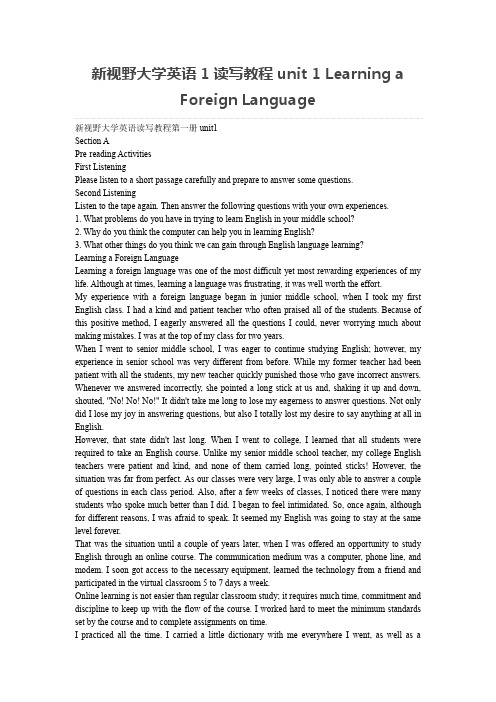
新视野大学英语读写教程第一册unit1Section APre-reading ActivitiesFirst ListeningPlease listen to a short passage carefully and prepare to answer some questions.Second ListeningListen to the tape again. Then answer the following questions with your own experiences.1. What problems do you have in trying to learn English in your middle school?2. Why do you think the computer can help you in learning English?3. What other things do you think we can gain through English language learning?Learning a Foreign LanguageLearning a foreign language was one of the most difficult yet most rewarding experiences of my life. Although at times, learning a language was frustrating, it was well worth the effort.My experience with a foreign language began in junior middle school, when I took my first English class. I had a kind and patient teacher who often praised all of the students.Because of this positive method, I eagerly answered all the questions I could, never worrying much about making mistakes. I was at the top of my class for two years.When I went to senior middle school, I was eager to continue studying English; however, my experience in senior school was very different from before. While my former teacher had been patient with all the students, my new teacher quickly punished those who gave incorrect answers. Whenever we answered incorrectly, she pointed a long stick at us and, shaking it up and down, shouted, "No! No! No!" It didn't take me long to lose my eagerness to answer questions. Not only did I lose my joy in answering questions, but also I totally lost my desire to say anything at all in English.However, that state didn't last long. When I went to college, I learned that all students were required to take an English course. Unlike my senior middle school teacher, my college English teachers were patient and kind, and none of them carried long, pointed sticks! However, the situation was far from perfect. As our classes were very large, I was only able to answer a couple of questions in each class period. Also, after a few weeks of classes, I noticed there were many students who spoke much better than I did. I began to feel intimidated. So, once again, although for different reasons, I was afraid to speak. It seemed my English was going to stay at the same level forever.That was the situation until a couple of years later, when I was offered an opportunity to study English through an online course. The communication medium was a computer, phone line, and modem. I soon got access to the necessary equipment, learned the technology from a friend and participated in the virtual classroom 5 to 7 days a week.Online learning is not easier than regular classroom study; it requires much time, commitment and discipline to keep up with the flow of the course. I worked hard to meet the minimum standards set by the course and to complete assignments on time.I practiced all the time. I carried a little dictionary with me everywhere I went, as well as anotebook in which I listed any new words I heard. I made many, sometimes embarrassing, mistakes. Once in a while I cried with frustration, and sometimes I felt like giving up. But I didn't feel intimidated by students who spoke faster than I did because I took all the time I needed to think out my ideas and wrote a reply before posting it on the screen. Then, one day I realized I could understand just about everything I came across, and most importantly, I could "say" anything I wanted to in English. Although I still made many mistakes and was continually learning, I had finally reaped the benefits of all that hard work.Learning a foreign language has been a most trying experience for me, but one that I wouldn't trade for anything. Not only did learning another language teach me the value of hard work, but it also gave me insights into another culture, and my mind was opened to new ways of seeing things. The most wonderful result of having learned a foreign language was that I could communicate with many more people than before. Talking with people is one of my favorite activities, so being able to speak a new language lets me meet new people, participate in conversations, and form new, unforgettable friendships. Now that I speak a foreign language, instead of staring into space when English is being spoken, I can participate and make friends. I am able to reach out to others and bridge the gap between my language and culture and theirs.Section BKeys to Successful Online LearningWhile regular schools still exist, the virtual classroom plays an important role in today's learning community. Job opportunities for students are expanding rapidly and more people of all ages are becoming aware of online learning that allows them to study at home. Online students, however, require unique qualities to be successful. The following list discusses some ideal qualities of successful online students.1. Be open-minded about sharing life, work, and learning experiences as part of online learning. Many different people find that the online method requires them to use their experiences and that online learning offers them a place to communicate with each other. This forum for communication removes the visual barriers that hinder some students from expressing themselves. In addition, students are given time to reflect on the information before replying. In this way, students can help to keep the online environment open and friendly.2. Be able to communicate through writing.In the virtual classroom nearly all communication is written, so it is critical that students feel comfortable expressing themselves in writing. Some students have limited writing abilities which need to be improved before or as part of the online experience. This usually requires extra commitment by these students. Whether working alone or in a group, students share ideas, perspectives and discussions on the subject being studied, and read about those of their classmates. In this way, students gain great insight from their peers, learning from each other as well as the instructor.3. Be willing to "speak up" if problems arise.Remember that instructors cannot see their students in an online course. This means students must be absolutely explicit with their comments and requests. If they experience technical difficulties, or problems in understanding something about the course, they MUST speak up; otherwise there is no way anyone can know something is wrong. If one person does not understand something, possibly several others have the same problem. If another student is able to help, she/he probably will. While explaining something to others, students reinforce their own knowledge about thesubject.4. Take the program seriously.Online learning is not easier than study in regular classrooms. In fact, many students say it requires much more time and effort. Requirements for online courses are not less than those of any quality program. Successful students, however, see online learning as a convenient way to receive their education — not an easier way. Many online students sit at computers for hours at a time during evenings and on weekends in order to complete their assignments. When other people are finished and having fun is most likely the time when online students do their course work. Online students need to commit 4 to 15 hours a week for each course.5. Accept critical thinking and decision making as part of online learning.Online courses require students to make decisions based on facts as well as experience. It is absolutely necessary for students to assimilate information and make the right decisions based on critical thinking. In a positive online environment, students feel valued by the instructor, by their classmates and by their own work.6. Be able to think ideas through before replying.Providing meaningful and quality input into the virtual classroom is an essential part of online learning. Time is given to allow for careful development of answers. Testing and challenging of ideas is encouraged. Many times online students will not always be right; they just need to be prepared to accept a challenge.7. Keep up with the progress of the course.Online learning is normally sequential and requires commitment on the students' part. Keeping up with the face-to-face class and completing all work on time is vital. Once students get behind, it is almost impossible to catch up. Students need to want to be there and need to want the experience. The instructor may have to communicate with students personally to offer help and remind them of the need to keep up.Just as many excellent instructors may not be effective online facilitators, not all students have the necessary qualities to perform well online. People who have the qualities discussed above usually make very successful online students. If you have these qualities, learning online may be one of the best discoveries you will ever make.Section CTeaching Children at HomeRecord numbers of children are being taken out of school and taught by their parents at home. Up to 100 children a month are leaving the classroom because parents are not satisfied with schools. Around 15,000 families now teach their children at home, a rise of 50 per cent from last year, according to the latest figures.This present rise in home schooling is blamed on the nature of examinations, not getting children into the school of choice, and dissatisfaction with teaching methods. Some parents prefer keeping children home because of attacks by other students and a lack of discipline in schools. Researchers say, however, many families prefer teaching at home because they feel the idea of public schooling is not modern. They believe schools will be things of the past in 20 years as media technology, like the Internet, teaches children. 1. ______Under the law, parents must teach their children, whether at school or at home. Community officials are charged with protecting their schooling. Professor Meighan of Nottingham University says parents were fed up with the requirements of existing schools. For him, schools are anout-of-date concept from the days of the town crier(市政传令员), when it was difficult to get information and a central person was needed to communicate knowledge. He also thinks parents are recognizing education is moving on and don't want their children to be held back by out-of-date methods. 2. ______Meighan suggests children will be taught at home using the Internet, computers, and video(录像片). He thinks future schools will be small groups of children, sharing equipment in their homes. The teachers may become advisers who sort through the information. 3. ______Future schooling was questioned by Sir Christopher Ball of the Royal(皇家的)Society of Arts. He thinks learning in the future will include an international curriculum and international standards. He sees some present models of schooling — community schools and home schooling, for example — becoming more central and other models, not yet existing, may develop. 4. ______ How Personal Choice Brings O-Level Success at 13Leslie Barson is already running the type of school that researchers think will teach children in the future. Based partly at a community centre and partly in family homes, the Otherwise Club includes some 35 families around north London. Professional teachers are brought in to help with special subjects, but mostly parents and children work together on units like studying the Greeks or the American Civil War, reading about events, making costumes(戏装), and learning how people used to live. 5.______ 6. ______Parents choosing home schooling say the freedom of home learning allows some children to sit one or two GCEs by the age of 13. Ms. Barson's own children, Luis, age 12, and 7-year-old Lilly, have never attended school. She pays around 2,000 pounds a year for private teachers to help in special areas. She set up the Otherwise Club six years ago with just a few students. She thinks the purpose of teaching children is to develop their self-worth. Her son agrees. Luis, now teaching himself math, said, "I like the freedom to learn things that interest me, especially music. I don't feel I am missing out on anything by not being at school because I am a member of various clubs and have friends who attend normal school." 7. ______ 8. ______The “Danger” of Separating StudentsHome schooling could change children's relations with their peers and older people because of long periods spent with their parents. Most professors agree future learning will be more centred around the home, and fear children could become isolated and shy. Professor Michael Barber of London University said pupils could spend half their time at school, half at home as a way to solve this problem. He believes very strongly that children need the experience of school to ensure the quality of being taught the basics and being examined. He thinks children must spend time with peers to learn the rules of work in a democratic(民主的)society and to learn how to deal with relations with more people than just their parents. Margaret Rudland, head teacher in Hammersmith, also thinks children must experience actual peer relations. 9. ______ 10. ______新视野大学英语1读写教程教案unit 1 Learning a Foreign LanguageBook One Unit OneObjectives:Students will be able to:1. grasp the main idea and the structure of the text ;2. understand the devices developing the paraphrases;3. master the key words and phrases and sentence patterns in the text;4. conduct a serious of reading, listening, speaking and writing activities related to the theme of the unit.Time Span: 4 Periods(Two for Section A and Two for Review of Section A ,Reading Skills and Section B)Section A Learning a Foreign LanguageTeaching Precedures:I. Pre-reading Activities: Listen, Look & Say1. Questions & Answers(Oral Practice)1).What problems do you have in trying to learn English in your middle school?(Like most students of my age, I had to be faced with many problems in learning English, such as pronunciation, grammar rules, and cultural background. And the most frustrating one was how to memorize a large body of new words. As far as the college life is concerned now, however, my big trouble with English learning is that my class is very large and I have few chances to practice my spoken English in class.)2).Do you think the computer can help you in learning English? Why or why not?(Because the computer, once networked, allows us more access to the outside world. I have found the computer course, though as difficult as regular classroom study, very suitable for me. For one thing, I have more freedom to set the pace of study for myself. For another, I could select the material to my taste or based on my English level. And best of all, I have more chances to exchange ideas with native speakers, without much worry about making mistakes.)3). What other things do you think we can gain through English language learning?(As a most rewarding experience of mine, learning English can bring me a lot of benefits. To begin with, it can teach me the value of practice. The more practice I do in listening, speaking, reading and writing, the more progress I make in English. Besides, it can give me insights into other cultures, keeping my mind open to new ways of thinking. And above all, it can help me communicate with many more people than before. Now talking with people in English is one of my favorite activities.)2. Watch the video and then discuss the topics as follows:(Episode clipped from The Sound of Music)1). What insight can we get from the video?(The same holds true for our English learning. For example, when you come across in reading such phrases as “far from perfect”, “hunger for knowledge” and “put yourself in others’ shoes”, you may find nothing special in them. But when they are linked to the Chinese expressions “远不尽人意”,“求知欲” and “设身处地为人家想想” , with which you are familiar, they are now well worth your attention. To sum up, the better combination there is of the unfamiliar and the familiar in your study, the greater interest you will take in the course.)2). What new light does the video throw on our English study?(So the best course open to us now is to apply what we have learned from books to what we are familiar or concerned with in our daily life. For instance, we are going to learn the sentence “ Now that I speak a foreign language, instead of staring into space when English is being spoken, I can participate and make friends”. We can use the pattern to express what is on our minds, such as “Now that the new college life is here to challenge us, instead of staying only in our dreams, all we can do is to face it cheerfully”. In short, where there is a better application of your knowledge to your life there is more progress. )3.Spot Dictation(Listen to the recording and fill in the blanks)Online learning, a form of ________ education, _____ to learning and other supportive resources that are _________ through a networked computer. With the development of the Internet, online learning often takes place on the Internet. In an online lesson, the computer _______ material in ________ to a learner’s _______. The computer asks the learner ___ more information and _________ appropriate material _____ on the learner’s input. The material can be as simple as ___________ lessons and their tests that are transcribed into a computer program.(distance, refers ,available ,displays, response, request, for, presents, based, traditional)II .Text Analysis: Main Idea and Devices for Developing It1.What is the main idea of the text ?(Learning a foreign language was one of the most difficult yet most rewarding experiences of my life.)Part I:( Para 1)Learning a foreign language was one of the most difficult yet most rewarding experiences of my life.Part II (Para.2-4):My different experiences with the regular course in junior and senior middle schools and at collegePart III (Para.5-7)My experiences with the online course helped me reap the benefits of hard work.2.Devices for developing the main idea1).演绎法(Deduction Organization) (from ‘general’ to ‘specific’)General statement (Topic):Learning a foreign language was one of the most difficult yet most rewarding experiences of my life.Specific statements:A. My experience in junior middle school (Para. 2):(a kind and patient teacher who praised all of the students … positive method…eagerly answered questions, at the top of my class)B .My experience in senior middle school (Para. 3):(an impatient teacher…punished those who made mistakes…shaking it up and down…shouted…lose my eagerness / desire to say anything in English)C.My experience at college(Para. 4):(far from perfect…very large class and better students… feel intimidated… afraid to speak…at the same level forever)D.My experience with the online course (Para. 5-7):(require commitment and discipline …virtual classroom…practice all the time…cry with frustration…feel like giving up…reaped the benefits of hard work)E.Conclusion (Para. 8):( a most trying experience, but one that I would not trade for anything…teach me the value of hard work…give me insights into another culture…my mind …opened to new ways of seeing things…the most wonderful result of having learned a foreign language …communicate with many more people than before…one of my favorite activities…bridge the gap between my culture and theirs)2).时空顺序法(Sequence of Time and Space)Typical Sentences:A .My experience with a foreign language began in junior middle school.(Para. 2) B. When I went to senior middle school. (Para.3)C. However, that state didn’t last long. When I went to college. (Para. 4)D .That was the situation until a couple of years later, when ...participated in the virtual classroom. (Para. 5)E. ... had finally reaped the benefits of all that hard work. (Para. 7)3).对比法(Comparison and Contrast)The comparison and contrast is centered around “the most difficult” and “the most rewarding”. The group of “difficult”:frustrating, punish, shout, lose my eagerness / desire to say anything in English, very large, far from perfect, feel intimidated, afraid to speak, (my English)stay at the same level, cry with frustration, feel like giving upThe group of “rewarding”:well worth the effort, at the top of my class, eager to study, understand about everything, reap the benefits of all that hard work, teach me the value of hard work, give me insights into another culture, able to bridge the gap between cultures.III.Key expressions & patternsExpressions:1.很值得去努力to be well worth the effort (L. 3)---Not everything in life is well worth our risk.2.在班里名列前茅to be at the top of the class (L. 7)---On the list of good policies in social contact, honesty should be at the top.3.失去说英语的欲望to lose my desire / eagerness to say anything in English (L.14)---As a result of her dishonesty, I lost my desire to form further friendship with her.4.远不尽人意to be far from perfect (L. 19)---Although our environment is still far from perfect, we haven’t lost the desire to change it for the better.5.永远停滞不前to stay at the same level forever (L. 26)---Sometimes our English learning seems to stay at the same level forever, but, in fact, this is not necessarily the case.6.接触到必要的设备to get access to the necessary equipment (L. 30)---Through online learning we get access to many new patterns of thinking.7.跟上课程进度. to keep up with the flow of the course (L. 33)---To keep up with the flow of world trade, China decided to join WTO.8. 满足课程最低限度的要求to meet the minimum standards set by the course(L. 34)---It also requires commitment and discipline to meet the minimum standards set by the university9.因挫折而哭泣to cry with frustration (L. 37)一些人因胜利而雀跃,而另一些人因失败而叹息,这种事情经常发生。
(完整版)新视野大学英语读写教程第三版第一册教案
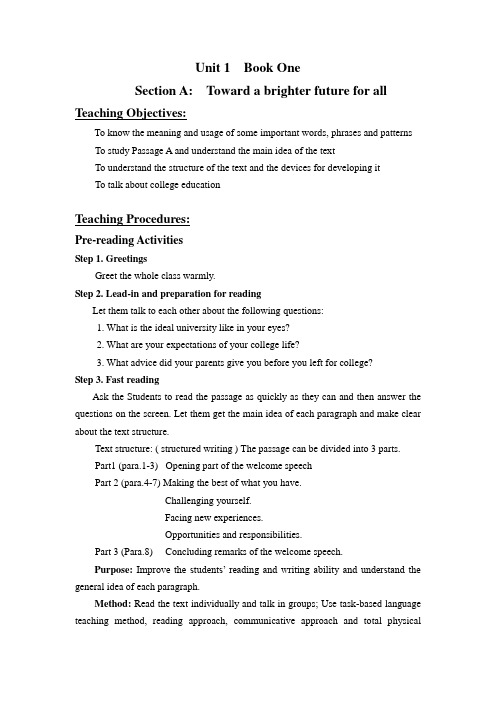
Unit 1 Book OneSection A: Toward a brighter future for all Teaching Objectives:To know the meaning and usage of some important words, phrases and patterns To study Passage A and understand the main idea of the textTo understand the structure of the text and the devices for developing itTo talk about college educationTeaching Procedures:Pre-reading ActivitiesStep 1. GreetingsGreet the whole class warmly.Step 2. Lead-in and preparation for readingLet them talk to each other about the following questions:1. What is the ideal university like in your eyes?2. What are your expectations of your college life?3. What advice did your parents give you before you left for college?Step 3. Fast readingAsk the Students to read the passage as quickly as they can and then answer the questions on the screen. Let them get the main idea of each paragraph and make clear about the text structure.Text structure: ( structured writing ) The passage can be divided into 3 parts.Part1 (para.1-3) Opening part of the welcome speechPart 2 (para.4-7) Making the best of what you have.Challenging yourself.Facing new experiences.Opportunities and responsibilities.Part 3 (Para.8) Concluding remarks of the welcome speech.Purpose: Improve the students’ reading and writing ability and understand the general idea of each paragraph.Method: Read the text individually and talk in groups; Use task-based language teaching method, reading approach, communicative approach and total physicalresponse method.Step 4. Preparation for details of the text on the screenStudents are required to look at the Words and Phrases on the screen and give a brief presentation in class.Words and Phrases:Purpose: Train the Students’ ability of unde rstanding and using foreign language.Method:Talk in groups, Use task-based language teaching method, communicative approach and total physical response method.1. (Para.1)pledge to do sth. 作保证,承诺China and the United states pledge to boost cooperation and exchange to ensure a better future for China-US ties.中美政府承诺将加强合作与交流以确保两国关系的未来更加美好。
大学英语第一课教案
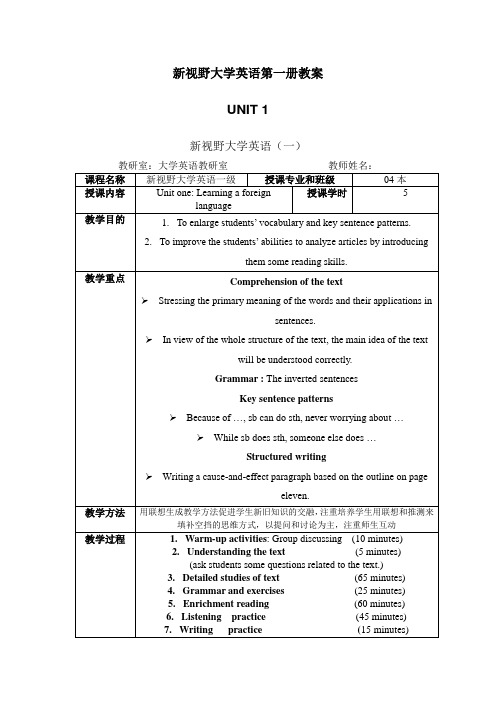
1.Vocabulary
2.Structure
3.Translation
Enrichment reading:
Elicit questions from the students, practice fast reading skills, focus on difficult sentences and cultural notes and improves students’ self-learning abilities.
Step 2:Ask the representatives of 2 or 3 groups to report the result of their discussion to the class.
2).Class discussion:
Summarize the answers to these questions.
6.Virtual:almost what is stated; made up
e.g The king was so much under the control of his wife that she was the
virtual leader of the country.
mitment:a promise to follow certain beliefs or certain course of actions
e.g Far from angry, he’s very happy.
e.g Her husband is far from handsome, he’s very ugly.
第三版新视野大学英语1-unit1学习指南

第三版新视野大学英语1-unit1学习指南本研究指南旨在帮助学生有效地研究第三版新视野大学英语1中的第一单元内容。
以下是一些研究建议和策略,以帮助你充分理解和掌握本单元的知识。
1. 阅读教材认真阅读教材中的每一篇文章和相关练题。
将重点内容标记出来,理解文章的主旨和主要细节。
在阅读过程中,注意词汇和句子的用法,并尝试归纳总结每篇文章的要点。
2. 研究词汇词汇是语言研究的基础,要用心研究本单元中的生词和短语。
可以通过制作词汇卡片、使用词汇记忆软件或与同学互相测试等方式来巩固词汇记忆。
3. 完成练题教材中的练题是巩固研究成果的重要方式。
认真完成每个练题,确保理解题目要求并能正确应用所学知识。
如有不理解的地方,可以寻求同学或老师的帮助。
4. 参与课堂讨论积极参与课堂讨论可以加深对研究内容的理解。
在课堂上,发表自己的观点、提出问题,并与同学互动交流。
这不仅可以加深自己的理解,还可以从他人的观点中获得新的启发。
5. 制定研究计划制定一个合理的研究计划,安排每天的研究时间。
将研究分成小块,每块专注于一项任务或目标。
遵守研究计划,并保持持续的研究动力。
6. 多种方式研究除了课本研究,还可以通过听英语广播、看英语电影和听英语歌曲等方式来提升英语听力和口语能力。
多种方式的研究可以使你的语言技能得到全面提高。
记住,学习是一个持续的过程,需要坚持和努力。
通过以上的学习建议和策略,相信你能够在第一单元中取得良好的学习效果。
祝你学习顺利!。
新视野大学英语1unit1教案
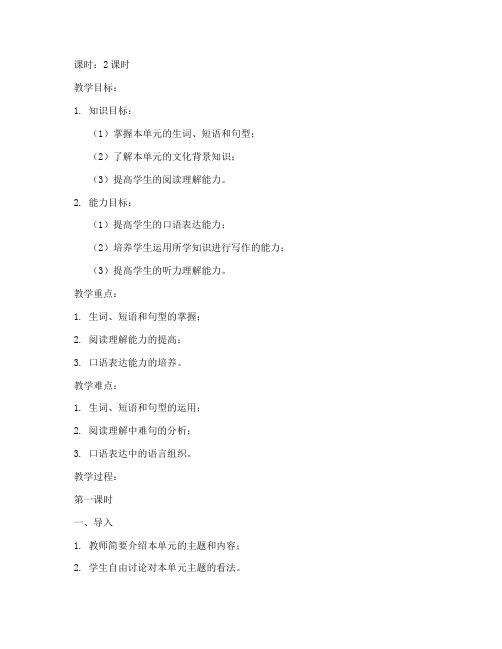
课时:2课时教学目标:1. 知识目标:(1)掌握本单元的生词、短语和句型;(2)了解本单元的文化背景知识;(3)提高学生的阅读理解能力。
2. 能力目标:(1)提高学生的口语表达能力;(2)培养学生运用所学知识进行写作的能力;(3)提高学生的听力理解能力。
教学重点:1. 生词、短语和句型的掌握;2. 阅读理解能力的提高;3. 口语表达能力的培养。
教学难点:1. 生词、短语和句型的运用;2. 阅读理解中难句的分析;3. 口语表达中的语言组织。
教学过程:第一课时一、导入1. 教师简要介绍本单元的主题和内容;2. 学生自由讨论对本单元主题的看法。
二、生词、短语和句型教学1. 教师带领学生逐一学习本单元的生词、短语和句型;2. 学生跟读、默写,巩固记忆;3. 教师讲解重点词汇、短语和句型的用法。
三、课文阅读1. 学生自读课文,理解大意;2. 教师引导学生分析课文中的难句,讲解语法知识;3. 学生朗读课文,巩固语音、语调。
四、课堂活动1. 教师组织学生进行小组讨论,分析课文中的文化背景知识;2. 学生分享自己的观点,提高口语表达能力。
第二课时一、复习1. 教师带领学生复习上一节课的生词、短语和句型;2. 学生跟读、默写,巩固记忆。
二、阅读理解1. 学生自读课文,完成阅读理解练习;2. 教师讲解阅读理解中的难题,分析解题技巧;3. 学生分享自己的阅读心得。
三、口语表达1. 教师组织学生进行角色扮演,模拟课文中的场景;2. 学生运用所学知识进行口语表达,提高语言组织能力。
四、写作1. 教师讲解写作技巧,指导学生完成写作任务;2. 学生运用所学知识进行写作,提高写作能力。
五、课堂小结1. 教师对本节课的学习内容进行总结;2. 学生分享自己的学习心得。
教学评价:1. 学生对生词、短语和句型的掌握程度;2. 学生在阅读理解、口语表达和写作方面的进步;3. 学生对课堂活动的参与度和积极性。
新视野大学英语1 电子优秀教案U1B1

学时
教案目的
1.To talk about college English learning。
2. To talk about college education。
3. To apply the words and phrases。
4. To master the speech writing skills。
Guide the Ss to master the writing skill: A topic sentence supported by details.
Unit 1 Fresh Start
I. Greet & introduction
1. Greet and introduce each other
•valuable life lessons, such as teamwork, leadership, or civic (公民) responsibility.
III. Text study
1.Read through the passage to get the main idea of it.
Try not to be a man of success, but rather try to become a man of value.
Section A Toward a brighter future for all
II.Warming up activities
1.Lead-in Questions
5. Detailed study of the text (85’):
6. Summary of the text. (10’)
7. Exercises. (20’)
新视野大学英语第一册unit1learning a foreign language讲课教案

Back
Learning a Foreign Language
Part One General
Part Two Specific
Part Three General
Para. 8: The rewarding of English learning
Paras. 2-7: The author tells his experiences with the regular 1c)outrhsePevaairnluame. 1oif.dhLdalereadrswcnohirnokgolas afonrdeiagtncloalnleggueaagsewwealsl aosnewoitfhththee 2o)nliinnsmeigchootssutirndstioeff.oitchuelrtcyuelttumresost rewarding experiences of my 3T) hinsewlpifawer.atyissoafbseoeuintgtthheinsgps;ecific difficulties of English learning 4) theTahbiislitpyatrotbtreidllgseuthseagbaopubtettwheeengednifeferraelnitdceualtuorfest.he whole 5) Copnaclsussaiogne:.Learning English is difficult yet rewarding.
导入
预习
小结
写作
Back
Main Idea of the Text
Learning a foreign language was one of
the most ____d_i_ff_ic_uylett most __re_w__a_r_d_in_g_experiences of my life.
新视野大学英语1教案参模板unit(第5.6学时)
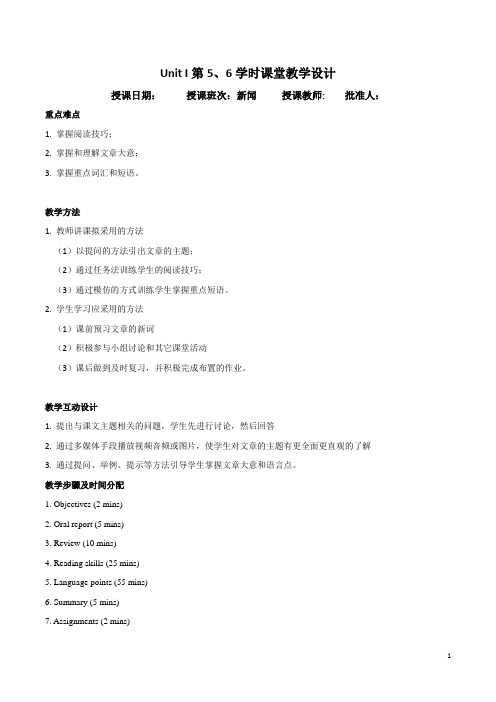
Unit I第5、6学时课堂教学设计
授课日期:授课班次:新闻授课教师: 批准人:重点难点
1. 掌握阅读技巧;
2. 掌握和理解文章大意;
3. 掌握重点词汇和短语。
教学方法
1. 教师讲课拟采用的方法
(1)以提问的方法引出文章的主题;
(2)通过任务法训练学生的阅读技巧;
(3)通过模仿的方式训练学生掌握重点短语。
2. 学生学习应采用的方法
(1)课前预习文章的新词
(2)积极参与小组讨论和其它课堂活动
(3)课后做到及时复习,并积极完成布置的作业。
教学互动设计
1. 提出与课文主题相关的问题,学生先进行讨论,然后回答
2. 通过多媒体手段播放视频音频或图片,使学生对文章的主题有更全面更直观的了解
3. 通过提问、举例、提示等方法引导学生掌握文章大意和语言点。
教学步骤及时间分配
1. Objectives (2 mins)
2. Oral report (5 mins)
3. Review (10 mins)
4. Reading skills (25 mins)
5. Language points (55 mins)
6. Summary (5 mins)
7. Assignments (2 mins)。
新视野大学英语第三版第一册第一课教案
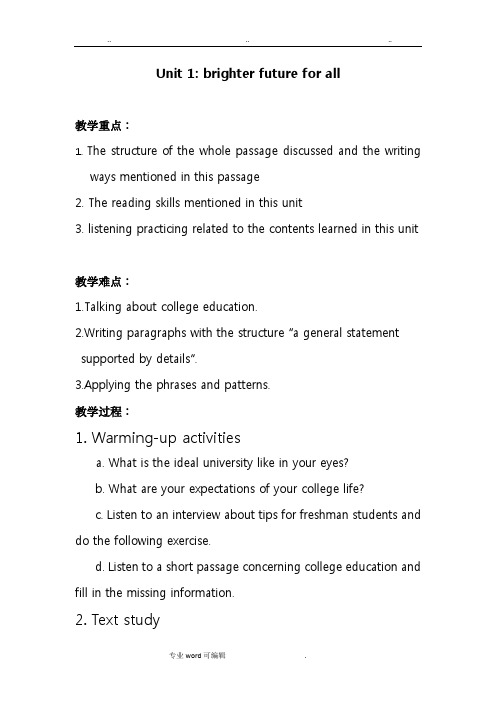
Unit 1: brighter future for all教学重点:1. The structure of the whole passage discussed and the writing ways mentioned in this passage2. The reading skills mentioned in this unit3. listening practicing related to the contents learned in this unit教学难点:1.Talking about college education.2.Writing paragraphs with the structure “a general statement supported by details”.3.Applying the phrases and patterns.教学过程:1. Warming-up activitiesa. What is the ideal university like in your eyes?b. What are your expectations of your college life?c. Listen to an interview about tips for freshman students and do the following exercise.d. Listen to a short passage concerning college education and fill in the missing information.2. Text studya. Main idea of the partsIn his welcome speech, the president urges students to take advantage of the unique opportunity to face new exciting experience and to challenge themselves so that they will reap the benefits of their college years. The president also expresses the university’s expectations of its students and of the responsibilities they carry.Part I (Para. 1-3): The president congratulates students on their achievement and reminds students of the fact that their current success was due to their own and their par ents’ efforts, and that their future is built on a solid foundation of the past.Part II (Para. 4-7): The president offers students comprehensive advice on how to make the most of their four college years and makes them realize the university’s expectation s and their own responsibilities.Part III (Para. 8): The students are called upon to cherish the opportunity and to bear in mind their responsibilities as citizens of their communities, their country and the world.b. Structure of the text✧Opening part of the welcome speech✧Advice✧Concluding partc. Summary of the text✧Main idea✧Language focusPledge to do sth. : China and the United states pledge to boost cooperation and exchange to ensure a better future for China-US ties.Make the most of sth.: This article introduces 7 tips for making the most of your iPhone5S.Reap the benefits: Keep on reading extensively, and you will reap the benefits sooner or later.Feel overwhelmed by sth.: Nowadays, many young people feel overwhelmed by the fierce competition in the job market.Stand chance of: Animals stand little chance of survival under such extreme weather.Take great pleasure in:He always takes great pleasure in lending a helping hand to people around him.Open the door to sth.: These useful suggestions open the door to better communication with your parents.3. Language applicationa. writing device✧Sentence writingParallelism:By placing two or more ideas of equal value in the same grammatical form enables us to express these ideas clearly and emphatically.Example: You may have cried tears of joy to be finally finished with high school; your parents may have cried tears of joy to be finally finished with doing your laundry!✧Paragraph writing: topic →details→conclusionExample:For you, these next four years will be a time unlike any other.(Topic sentence) Here you are surrounded by great resources: interesting students from all over the country, a learned and caring faculty, a comprehensive library, great sports facilities, and student organizations covering every possible interest from the arts to science, to community service and so on.(Detail 1: What is available to you on campus) You will have the freedom to explore and learn about new subjects. You will learn to get by on very little sleep, meet fascinating people, and pursue new passions. (Detail 2: What you can do) I wantto encourage you to make the most of this unique experience, and to use your energy and enthusiasm to reap the benefits of this opportunity. (Concluding sentence)Activities performed in class:⏹Do you think a university education can change a person’slife? In what way and why?⏹How do you think of those successful people such as BillGates who dropped out of university?⏹What are you going to do at university in order to samplewidely and challenge yourself?Viewing, listening and speakingUnit 1 Traces of the past教学重点:1.talk about past events and their impacts on the present2.discuss in groups the activities you do at weekends and add asmany activities as possible教学难点:1.conduct an interview2.describe an event教学过程:Opening-up1.talk about the activities shown in the pictures2.Work in pairs and compare your answers.Listening to the word1.Ask Ss to watch a podcast to get its general idea and discuss their answers in groups.2.Ask Ss to watch a podcast and fill in the blanks.3.Ask Ss to discuss the following questions based on what they have heard.Questions:1.What did you do last weekend? Did you enjoy it? Why orwhy not?2.What can you learn from Mother Teresa’s words “Ican do nogreat things, only small things with great love”3.What childhood experience did you have that had a greatimpact on your present life?4.Did your parents make you take up a hobby such as playingthe piano, practicing calligraphy or playing table tennis when you were a child? Did you like it at that time? How doyou think about it now?Role-playWork in pairs and role-play one of the following situations by using skills for asking for and giving recommendations Situation 1: seeing a movieSituation 2: going out for dinnerAssignment:Work in groups of four. Share briefly with your group members a recent event you went to, e.g. a festival, a concert, a sports event, an exhibition, a play, a party, or a film.。
新视野大学英语第三版视听说教程第一册教案(Units1-5)
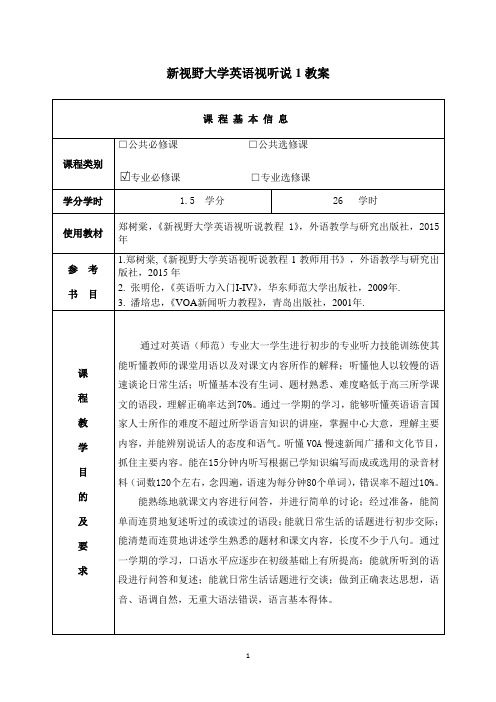
新视野大学英语视听说1教案
课程基本信息
课程类别
□公共必修课 □公共选修课
专业必修课 □专业选课
学分学时
1.5 学分
26 学时
使用教材
郑树棠,《新视野大学英语视听说教程1》,外语教学与研究出版社,2015年
参考
书目
1.郑树棠,《新视野大学英语视听说教程1教师用书》,外语教学与研究出版社,2015年
2.张明伦,《英语听力入门I-IV》,华东师范大学出版社,2009年.
Speaking skills:Keeping a conversation going
Keeping a conversation going is an important speaking skill for exchanging information with or showing politeness to other people. There are several ways to keep a conversation going.
3) keep a conversation going
4) conduct an interview
4. Vocabulary, and Expression:
social, clubbing, disco, cute, fish and chips, Johannesburg, orphanage, Cuban, FIFA…
新视野大学英语第三版第一册Unit-1教案
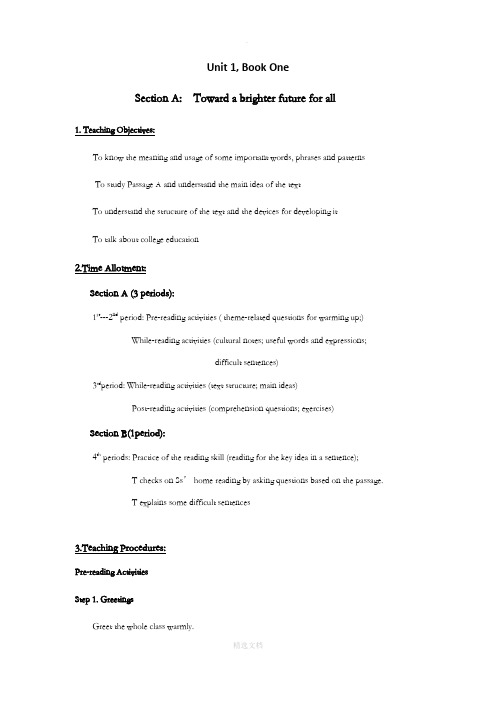
Unit 1, Book OneSection A: Toward a brighter future for all1. Teaching Objectives:To know the meaning and usage of some important words, phrases and patternsTo study Passage A and understand the main idea of the textTo understand the structure of the text and the devices for developing itTo talk about college education2.Time Allotment:Section A (3 periods):1st---2nd period: Pre-reading activities ( theme-related questions for warming up;)While-reading activities (cultural notes; useful words and expressions;difficult sentences)3rd period: While-reading activities (text structure; main ideas)Post-reading activities (comprehension questions; exercises) Section B(1period):4th periods: Practice of the reading skill (reading for the key idea in a sentence);T checks on Ss’ home reading by asking questions based on the passage.T explains some difficult sentences3.Teaching Procedures:Pre-reading ActivitiesStep 1. GreetingsGreet the whole class warmly.Step 2. Lead-in and preparation for readingLet them talk to each other about the following questions:1. What is the ideal university like in your eyes?2. What are your expectations of your college life?3. What advice did your parents give you before you left for college?Step 3. Fast readingAsk the Students to read the passage as quickly as they can and then answer the questions on the screen. Let them get the main idea of each paragraph and make clear about the text structure.Text structure: ( structured writing ) The passage can be divided into 3 parts.Part1 (para.1-3) Opening part of the welcome speechPart 2 (para.4-7) Making the best of what you have.Challenging yourself.Facing new experiences.Opportunities and responsibilities.Part 3 (Para.8) Concluding remarks of the welcome speech.Purpose: Improve the students’ reading and writing ability and understand the general idea of each paragraph.Method: Read the text individually and talk in groups; Use task-based language teaching method, reading approach, communicative approach and total physical response method.Step 4. Preparation for details of the text on the screenStudents are required to look at the Words and Phrases on the screen and give a brief presentation in class.Words and Phrases:Purpose: Train the Students’ ability of understandi ng and using foreign language.Method:Talk in groups, Use task-based language teaching method, communicative approach and total physical response method.1. (Para.1)pledge to do sth. 作保证,承诺China and the United states pledge to boost cooperation and exchange to ensure a better future for China-US ties.中美政府承诺将加强合作与交流以确保两国关系的未来更加美好。
BU新视野大学英语第一册教案
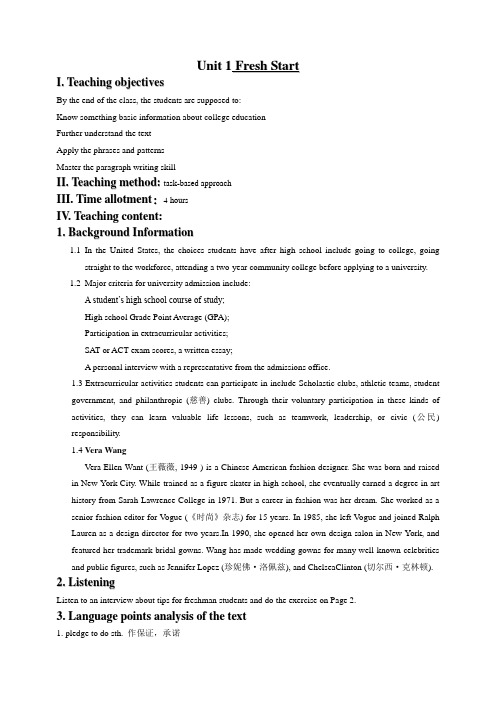
U n i t1F r e s h S t a r tI.T e a c h i n g o b j e c t i v e sBy the end of the class, the students are supposed to:Know something basic information about college educationFurther understand the textApply the phrases and patternsMaster the paragraph writing skillI I.T e a c h i n g m e t h o d:task-based approachI I I.T i m e a l l o t m e n t:4 hoursI V.T e a c h i n g c o n t e n t:1.B a c k g r o u n d I n f o r m a t i o n1.1In the United States, the choices students have after high school include going to college, goingstraight to the workforce, attending a two-year community college before applying to a university.1.2Major criteria for university admission include:A student’s high school course of study;High school Grade Point Average (GPA);Participation in extracurricular activities;SAT or ACT exam scores, a written essay;A personal interview with a representative from the admissions office.1.3 Extracurricular activities students can participate in include Scholastic clubs, athletic teams, studentgovernment, and philanthropic (慈善) clubs. Through their voluntary participation in these kinds of activities, they can learn valuable life lessons, such as teamwork, leadership, or civic (公民) responsibility.1.4 Vera WangVera Ellen Want (王薇薇, 1949-) is a Chinese-American fashion designer. She was born and raised in New York City. While trained as a figure skater in high school, she eventually earned a degree in art history from Sarah Lawrence College in 1971. But a career in fashion was her dream. She worked as a senior fashion editor for V ogue (《时尚》杂志) for 15 years. In 1985, she left V ogue and joined Ralph Lauren as a design director for two years.In 1990, she opened her own design salon in New York, and featured her trademark bridal gowns. Wang has made wedding gowns for many well-known celebrities and public figures, such as Jennifer Lopez (珍妮佛·洛佩兹), and ChelseaClinton (切尔西·克林顿).2.L i s t e n i n gListen to an interview about tips for freshman students and do the exercise on Page 2.3.L a n g u a g e p o i n t s a n a l y s i s o f t h e t e x t1. pledge to do sth. 作保证,承诺中美政府承诺将加强合作与交流以确保两国关系的未来更加美好。
新视野大学英语 unit1教案
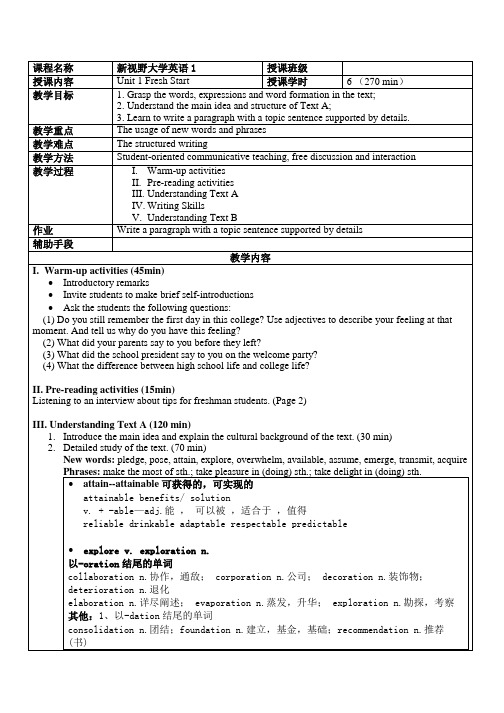
(从视线以外的地方)出现;出来
Richard was waiting outside the door as she emerged.当她出现的时候,理查德正等候在门外.
冒出,露出(from):
例:The sun emerges from behind the clouds.太阳从云层里露出.
attain--attainable可获得的,可实现的
attainablebenefits/ solution
v. + -able—adj.能 , 可以被 ,适合于 ,值得
reliable drinkable adaptablerespectable predictable
explore v. exploration n.
I got bored with my job.我对工作感到厌倦了。
2 -ed加在少数不及物动词之后构成形容词,表示该动作已经完成。例如:
a retired teacher一位退了休的老师
My yard is covered with fallen leaves.我家的院子里铺满了落叶。
3后缀-ed和后缀-ing的不同
7、以-eration结尾的单词
acceleration v.加速,促进;consideration n.考虑,照顾;cooperation n.合作,协作
desperation n.绝望;generation n.一代人;liberation n.解放;operation n.操作,生效,手术
8、以-iration结尾的单词
suppose表示有一定根据的猜想。在口语短语中,I suppose和I guess用法相同,但suppose更常见于英国英语,guess更常见于美国英语。例如:
新视野大学英语(第三版)读写教程第一册Unit1教案及课后答案
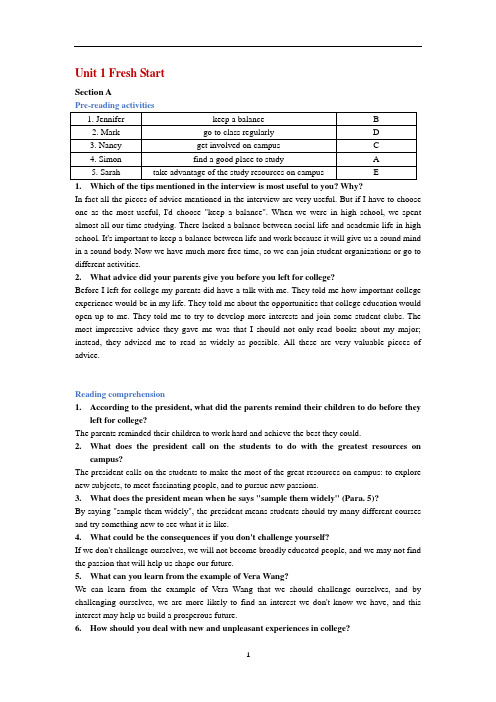
Unit 1 Fresh StartSection AIn fact all the pieces of advice mentioned in the interview are very useful. But if I have to choose one as the most useful, I'd choose "keep a balance". When we were in high school, we spent almost all our time studying. There lacked a balance between social life and academic life in high school. It's important to keep a balance between life and work because it will give us a sound mind in a sound body. Now we have much more free time, so we can join student organizations or go to different activities.2.What advice did your parents give you before you left for college?Before I left for college my parents did have a talk with me. They told me how important college experience would be in my life. They told me about the opportunities that college education would open up to me. They told me to try to develop more interests and join some student clubs. The most impressive advice they gave me was that I should not only read books about my major; instead, they advised me to read as widely as possible. All these are very valuable pieces of advice.Reading comprehension1.According to the president, what did the parents remind their children to do before theyleft for college?The parents reminded their children to work hard and achieve the best they could.2.What does the president call on the students to do with the greatest resources oncampus?The president calls on the students to make the most of the great resources on campus: to explore new subjects, to meet fascinating people, and to pursue new passions.3.What does the president mean when he says "sample them widely" (Para. 5)?By saying "sample them widely", the president means students should try many different courses and try something new to see what it is like.4.What could be the consequences if you don't challenge yourself?If we don't challenge ourselves, we will not become broadly educated people, and we may not find the passion that will help us shape our future.5.What can you learn from the example of Vera Wang?We can learn from the example of Vera Wang that we should challenge ourselves, and by challenging ourselves, we are more likely to find an interest we don't know we have, and this interest may help us build a prosperous future.6.How should you deal with new and unpleasant experiences in college?We should not worry, and we should learn to face this new part of our life with enthusiasm. College experiences, pleasant or unpleasant, will provide us with valuable lessons and will enrich our life.7.How do you understand "Now it is your turn" (Para. 7)?The expression "Now it is your turn" means that now it is time for you to acquire knowledge and to pass it on.8.How does the president's speech impress you?The president's welcoming speech is really impressive. He mentions many important things about college life, the resources available on campus, as well as the opportunities we have and the responsibilities that we should take. The speech is very inspiring.1. What role do you think a university education will play in your life?A university education will play a very important role in my life, and it will benefit me in a number of ways. In the university I can acquire specialized knowledge about my major, and develop my critical thinking and research skills. I will have the opportunities to meet and share ideas with people of different minds. I can gain a broader view of the world by meeting people from diverse backgrounds and cultures. And I will start my life journey of self-discovery, self-improvement, and self-fulfillment.2.Do you think a university education can change a person's life? In what way and why? Yes, absolutely. With a university education, a person will have more freedom and therefore more choices. This education experience provides unlimited potential. Moreover, a university education provides the means for one to succeed. Not only will a person obtain knowledge and skills essential for his career development, but he will also develop an independent mind and be able to make right decisions on his own.3.How do you think about those successful people such as Bill Gates who dropped out ofuniversity?I admire those who dropped out of university and yet had made fame for themselves by achieving big goals. Some people use those successful college dropouts as counterexamples to show their belief that a person can succeed even without a university education. Chances are that most people do not have the same mind, talent, determination, or opportunities as Bill Gates, Steve Jobs, and Mark Zuckerberg did; therefore, they might not be able to achieve success without having a university education. In fact, a university education will equip them with the necessary knowledge and skills which will help them to succeed.4.How do you understand the statement "If you think education is expensive, tryignorance"?Nowadays education is getting more and more expensive, especially college education. And there are people who choose to give up education because of the high cost. But without education, one would not be able to acquire knowledge that an education will offer. In other words, they would be "ignorant". The result would be that "ignorant" people will suffer even more or pay even more for being so. It is true that education is expensive, but if you try "ignorance", the cost would be even higher.5.What are you going to do at university in order to sample widely and challenge yourself? To sample widely and challenge myself, I am going to venture out of my comfort zone and do what I have not had the courage to do. For instance, I will make friends with people from diversebackgrounds and cultures. I will take a swimming class and learn how to swim. I will attend lectures, join student clubs, and try all kinds of food. Most of all, I will do whatever it takes to make the most of the four years and try to become a well-rounded graduate.Words in use1. Given the chance to show his ability, he regained (confidence) and began to succeed in school.2. It is so difficult to (explore) the bottom of the ocean because some parts are very deep.3. It was about 30 seconds before Alex (emerged) from the water; we were quite scared.4. We often (assume) that when other people do the same things as we do, they do them for the same reasons; but this assumption is not always reasonable.5. There is widespread concern that the rising unemployment may(pose)a threat to social stability.6. After a(n) (comprehensive) physical exam, my doctor said I was in good condition except that my blood pressure was a little high.7. It is well known that China is a country with rich natural (resources) and a very big population.8. Some people believe that the earth can (yield) enough food to support at least twice its present population.9. Sam (inherited) the gift of imagination from his family, but he lacked the driving power to take action.10. A bee that has found honey is able to (transmit) to other bees the information they need in order to collect the honey.Word building: Practiceun-cover ➝ 1)(uncover)easy ➝ 2)(uneasy)load ➝ 3)(unload)-antapply ➝ 4)(applicant)resist ➝ 5)(resistant)account ➝ 6)(accountant)assistant ➝ 7)(assist)-ifysimple ➝ 8)(simplify)note ➝ 9)(notify)quality ➝ 10)(qualify)class ➝ 11)(classify)1. Despite being (classified)as a meat-eater, the panda has a diet that is overwhelmingly vegetarian.2. They have developed computerized systems which will greatly (assist) all library users so that they will not need the help of others.3. Changes have been made to the construction requirements in this city in order to make the buildings and highways more (resistant) to earthquakes.4. After a two-month inquiry, the police have (uncovered)the three men's intention to rob a bank and have arrested them.5. Consumers say they are (uneasy) about using their credit cards over the Internet because they are afraid of Internet fraud (欺诈) and identity theft.6. A college degree and some working experience should (qualify) you for the job advertised in the newspaper.7. The British ship arrived at the port this morning and is (unloading) its contents in the harbor now.8. As a human resources manager, I see many job (applicants)who are technically skilled, but have bad attitudes.9. The teacher (simplified) his instructions so that the small children could understand him better.10. My major was literature. However, now I'm working in a firm as a(n) (accountant), dealing with numbers every day.11. The committee's decision will be (notified) to all employees next week.Banked clozeUniversity students come from different parts of the country with various purposes. However, a closer look at their reasons for studying at the university will enable us to 1)(classify)them roughly into three groups: those who have a(n) 2)(passion)for learning, those who wish to 3)(attain) a bright future, and those who learn with no definite purpose.Firstly, there are many students who learn simply because they 4)(pursue) their goal of learning. Some read a wealth of British and American novels because they are keenly interested in literature. Others sit in front of the computer screen, working on a new program, 5)(virtually) day and night, because they find some computer programs 6)(fascinating), and they dream of becoming a "Bill Gates" one day.Secondly, there are students who work hard mainly for a better and more 7)(prosperous) future. It seems that the majority of students fall into this group. After admission to the university, they read books after books to 8)(acquire) knowledge from all of the resources which are 9)(available) to them, and finally, to succeed in the future job market.Thirdly, there are still some students who learn without a clear goal. They take courses, finish homework, enjoy life on campus, but don't want to 10)(sample)anything new or challenging. They have no idea what they will be doing after college. And they may end up with nothing in their lives.Expressions in use1. My family 1)(got by) on my father's unemployment benefit after he lost his job.2. Many subway riders read books or listen to music in order to 2)(make the most of) their time on the way to work.3. In order to make sure he would be able to attend the meeting, I called him up two weeks 3)(in advance).4. Experts say our company is amazing in that sales have been increasing steadily 4)(over time).5. In order to 5)(reap the benefits of) the physical exercise, you have to exercise regularly, and for at least half an hour each time.6. They all tried to talk 6)(all at once), but I couldn't hear anything they said.7. Yellow flowers in the field always 7)(remind) me 8)(of) my childhood in the countryside.8. We have been practicing for so long and so hard that our team should 9)(stand a chance of) winning the game.9. Research on genes will 10)(open the door to) exciting new medical treatments.10. Every one of you has made a contribution and I 11)(take pleasure in)acknowledging what each of you has done to make this academic convention such a success.Structure analysis: PracticeA B B CStructured writing: PracticeThere are some things you can do to succeed in college. First, pursue passions. Your passions will broaden your mind and make your life interesting. Second, never let go of any opportunities that come your way. College is full of unique opportunities, which will enable you to sample new things and meet wonderful people. Lastly, take responsibilities. In college you must learn to be responsible for your own decisions and actions. With the passions, the opportunities, and the ability to take responsibilities, you will become successful not only in college, but also in your future career.Translation苏格拉底是古希腊哲学家,被誉为现代西方哲学的奠基人。
新视野大学英语(第一册)Book 1 Unit 1 Section A Learning a Foreign language教案

1)Write a passage about your ownEnglishlearning experience with some of the language points in this passage.
2)Preview Section B
Step 5 Assignment
5)to stay at the same level forever
6)to get access to the necessary equipment
7)to keep up with the flow of the course
8)to meet the minimum standards set by the course
acquisition n. ( CN)获得或购得之物;(UN)获得
8.awful
9.instruct vt.
1.)指示,命令,吩咐=order
2.)教授;训练;指导[(+in)] =teach
3.)通知,告知
10. anxious adj.
1.)焦虑的,挂念的[(+about/at/for)]
2.)令人焦虑的
9)to cry with frustration
10)to feel like giving up
11)to reap the benefits of hard work
12)not to trade sth for anything
13)to teach me the value of hard work
B.by the age of eight
C.before they are five
新视野大学英语读写教程第三版第一册unit1教案
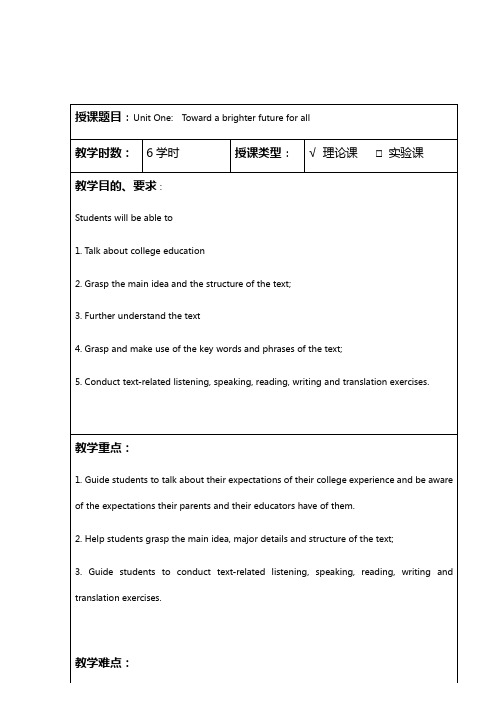
*I want to encourage you to make the most of this unique experience, and to use your energy and enthusiasm to reap the benefits o this opportunity. (parea4)
take great pleasure in doing sth.乐于做某事
open the door to sth.给……打开方便之门
2)Difficult sentences:
*Your achievement is the triumph of years of hard work, both of your own and of your parents and teachers.(para 1)
3.Guide students to make a summary of the text.
教学方法和手段:
municative teaching method;
2.Grammar-translation teaching method;
3.Multimedia-assisted teaching.
*You are the inheritors of the hard work of your families and the hard work of many countless others who came before you. They built and transmitted the knowledge you will need to success.(para7)
新视野大学英语第一册教案unit_1
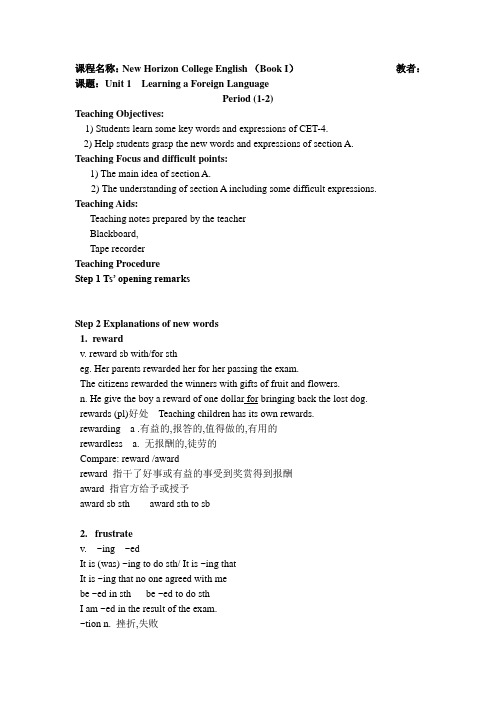
课程名称:New Horizon College English (Book I)教者:课题:Unit 1 Learning a Foreign LanguagePeriod (1-2)Teaching Objectives:1) Students learn some key words and expressions of CET-4.2) Help students grasp the new words and expressions of section A.Teaching Focus and difficult points:1) The main idea of section A.2) The understanding of section A including some difficult expressions. Teaching Aids:Teaching notes prepared by the teacherBlackboard,Tape recorderTeaching ProcedureStep 1 Ts’ opening remarksStep 2 Explanations of new words1.rewardv. reward sb with/for stheg. Her parents rewarded her for her passing the exam.The citizens rewarded the winners with gifts of fruit and flowers.n. He give the boy a reward of one dollar for bringing back the lost dog.rewards (pl)好处Teaching children has its own rewards.rewarding a .有益的,报答的,值得做的,有用的rewardless a. 无报酬的,徒劳的Compare: reward /awardreward 指干了好事或有益的事受到奖赏得到报酬award 指官方给予或授予award sb sth award sth to sb2.frustratev. ~ing ~edIt is (was) ~ing to do sth/ It is ~ing thatIt is ~ing that no one agreed with mebe ~ed in sth be ~ed to do sthI am ~ed in the result of the exam.~tion n. 挫折,失败Compare: beat , defeat, discourage3.positivea. Do not just watch me; give me some ~advice.(effective, helpful)We still do not have a ~ answer as to how he died.(definite)Be ~ of /that : Are you ~ that he is the man you saw yesterday?Are you ~ of her honesty?近: definite 反: negativemunicatev. ~ sth to 向…传达~ with 和…沟通(相连)We should learn to ~ with others.The officer ~d his order to the soldiers by radio.She tried to ~ her thoughts to her children.~tion n. ~tive a. 愿意说的~nicable a.可传达的5.mediumn. Air is a ~ of sound.Newspaper is a prime ~ of communication.The boy is of ~ height for his ageCompare: ~ / middle ~ 指按照具体或抽象标准衡量中等或适中的Middle 指距离.要求.标准.方位等的中间A man was lying in the middle of the road.I want to buy a ~-sized coat.6. accessn. have ( get, gain ) ~ to sth ( sb )The only ~ to that building was guarded by the soldiers.He was not allowed ~ to his brother who was in prison.It is difficult to gain ~ to him.Students must have ~ to good books.accessible ( to ) a. 容易得到的,可以使用的accessibility ( to ) 易接近,易取得Compare: assess 评定(估,价),核定,判断, asset 优点,天赋,(复数)资产excess 超过,超量,过剩mitment]n. make/take/undertake a ~ to do sthHe felt he did not have to make such a ~ to Mary.I do not want to get married because I do not want any ~s.Commit v. commit a crime /mistake commit suicidecommit oneself to 承担义务,承诺admit ,emit, limit, omit, permit, submit, transmit8. minimumn. The ~ passing mark is 40 out of 100.The temperature reached a ~ at midnight.~ ( pl )- minimums or minima (反) maximummini- 微型的,小的miniskirt minibusminimal a. 最小的,最低限度的minimize v. 使减少到最低限度9.embarrassvt. It ~ed her that her husband was drunk at the dinner.~ing a. ~ed a. ~ingly adv. ~ment n. 局促不安,难堪be/feel ~ed sth is ~ing ~ sb with sth/by doing sthShe was ~ed when they asked her age.I do not like making speeches in public; It is so ~ing.Compare:~ing/~ed/awkward~ing (某事,某种情理)使人尴尬~ed (某人)尴尬的awkward a.尴尬的,棘手的,可修饰人,也可修饰物.He was in an awkward situation.10. benefitn. He told me that he got no personal ~ from the businessRain will ~ the crops.v. (sth.) ~ sb ; ~ sb ; ~ (a lot/greatly) from/by (sth./doing sth.)for the ~ of =for the interest / good of ; be of ~ to sb. /sth. 对….有裨益I travel for the ~ of my health.The book was not of much ~ to me.beneficial a.Compare: ~ ; good ; profit11.be well worth sth./doing sth.A bird in hand is worth two in bush.The picture is worth ten thousand dollars.The film is well worth seeing.12.not only….but alsoShe is not only a good wife , but she is also a good mother.Not only did we enjoy the film, but we also had a wonderful time.另外: Only in this way can you hope to finish the work at the end of this month.当它连接两个并列成分做主语是,谓语的单复数采用就近原则,由but also 后的名词决定,英语中还有either….or… ; neither….nor….Not only she but also I like the dress.13. reap the benefits ofHe has reaped the benefits of a first-class education.I hope you will reap the benefits of investing in it.14.reach out ( to )We must ~ to those in need.reach out for You must reach out for any opportunity that comes your way.reach for He reached for the phone and dialed the number.15. rade…for/with:歌迷用五张光盘换到一张演唱会的入场券。
第三版新视野大学英语1-unit1教案
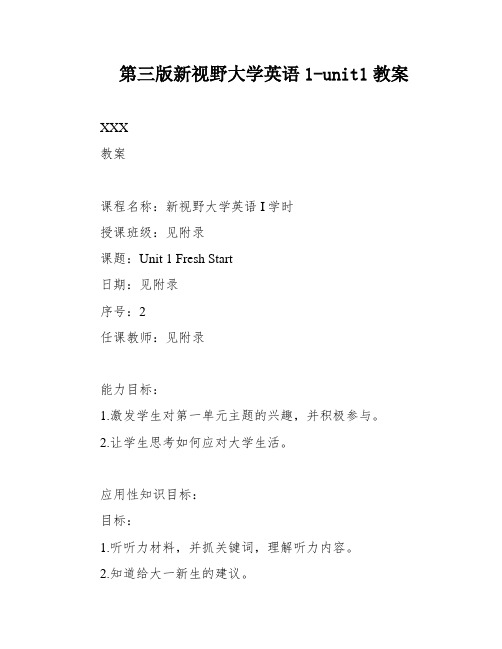
第三版新视野大学英语1-unit1教案XXX教案课程名称:新视野大学英语I学时授课班级:见附录课题:Unit 1 Fresh Start日期:见附录序号:2任课教师:见附录能力目标:1.激发学生对第一单元主题的兴趣,并积极参与。
2.让学生思考如何应对大学生活。
应用性知识目标:目标:1.听听力材料,并抓关键词,理解听力内容。
2.知道给大一新生的建议。
3.正确的发音朗读单词和短语。
教学训练项目(任务):1.听力技巧训练:抓关键词,理解听力内容。
2.新生建议听力活动。
3.词汇训练。
教学媒体准备:1.新视野大学英语I光盘。
2.新视野大学英语I unit1课件。
教学活动步骤及时间安排:1.问候和介绍(10分钟)2.说课(30分钟)3.主题讲解:大学新生的新起点(10分钟)4.听力活动:听一篇采访(20分钟)5.词汇训练(30分钟)板书设计:听力XXX:1.Keep a balance2.Go to class regularly3.Participate in Campus ActivitiesGetting XXX is a great way to make new XXXJoining clubs。
attending events。
XXX。
By doing so。
you can attain a sense of XXX.4.Find a XXXFinding a good place to study is crucial for academic success。
Whether it's the library。
a quiet coffee shop。
or a study room in your dorm。
it's important to have a designated space where you XXX studying。
you can XXX.5.Utilize Campus Study ResourcesXXX of study resources to help students succeed。
- 1、下载文档前请自行甄别文档内容的完整性,平台不提供额外的编辑、内容补充、找答案等附加服务。
- 2、"仅部分预览"的文档,不可在线预览部分如存在完整性等问题,可反馈申请退款(可完整预览的文档不适用该条件!)。
- 3、如文档侵犯您的权益,请联系客服反馈,我们会尽快为您处理(人工客服工作时间:9:00-18:30)。
课程名称:New Horizon College English (Book I)教者:课题:Unit 1 Learning a Foreign LanguagePeriod (1-2)Teaching Objectives:1) Students learn some key words and expressions of CET-4.2) Help students grasp the new words and expressions of section A.Teaching Focus and difficult points:1) The main idea of section A.2) The understanding of section A including some difficult expressions. Teaching Aids:Teaching notes prepared by the teacherBlackboard,Tape recorderTeaching ProcedureStep 1 Ts’ opening remarksStep 2 Explanations of new words1.rewardv. reward sb with/for stheg. Her parents rewarded her for her passing the exam.The citizens rewarded the winners with gifts of fruit and flowers.n. He give the boy a reward of one dollar for bringing back the lost dog.rewards (pl)好处Teaching children has its own rewards.rewarding a .有益的,报答的,值得做的,有用的rewardless a. 无报酬的,徒劳的Compare: reward /awardreward 指干了好事或有益的事受到奖赏得到报酬award 指官方给予或授予award sb sth award sth to sb2.frustratev. ~ing ~edIt is (was) ~ing to do sth/ It is ~ing thatIt is ~ing that no one agreed with mebe ~ed in sth be ~ed to do sthI am ~ed in the result of the exam.~tion n. 挫折,失败Compare: beat , defeat, discourage3.positivea. Do not just watch me; give me some ~advice.(effective, helpful)We still do not have a ~ answer as to how he died.(definite)Be ~ of /that : Are you ~ that he is the man you saw yesterday?Are you ~ of her honesty?近: definite 反: negativemunicatev. ~ sth to 向…传达~ with 和…沟通(相连)We should learn to ~ with others.The officer ~d his order to the soldiers by radio.She tried to ~ her thoughts to her children.~tion n. ~tive a. 愿意说的~nicable a.可传达的5.mediumn. Air is a ~ of sound.Newspaper is a prime ~ of communication.The boy is of ~ height for his ageCompare: ~ / middle ~ 指按照具体或抽象标准衡量中等或适中的Middle 指距离.要求.标准.方位等的中间A man was lying in the middle of the road.I want to buy a ~-sized coat.6. accessn. have ( get, gain ) ~ to sth ( sb )The only ~ to that building was guarded by the soldiers.He was not allowed ~ to his brother who was in prison.It is difficult to gain ~ to him.Students must have ~ to good books.accessible ( to ) a. 容易得到的,可以使用的accessibility ( to ) 易接近,易取得Compare: assess 评定(估,价),核定,判断, asset 优点,天赋,(复数)资产excess 超过,超量,过剩mitment]n. make/take/undertake a ~ to do sthHe felt he did not have to make such a ~ to Mary.I do not want to get married because I do not want any ~s.Commit v. commit a crime /mistake commit suicidecommit oneself to 承担义务,承诺admit ,emit, limit, omit, permit, submit, transmit8. minimumn. The ~ passing mark is 40 out of 100.The temperature reached a ~ at midnight.~ ( pl )- minimums or minima (反) maximummini- 微型的,小的miniskirt minibusminimal a. 最小的,最低限度的minimize v. 使减少到最低限度9.embarrassvt. It ~ed her that her husband was drunk at the dinner.~ing a. ~ed a. ~ingly adv. ~ment n. 局促不安,难堪be/feel ~ed sth is ~ing ~ sb with sth/by doing sthShe was ~ed when they asked her age.I do not like making speeches in public; It is so ~ing.Compare:~ing/~ed/awkward~ing (某事,某种情理)使人尴尬~ed (某人)尴尬的awkward a.尴尬的,棘手的,可修饰人,也可修饰物.He was in an awkward situation.10. benefitn. He told me that he got no personal ~ from the businessRain will ~ the crops.v. (sth.) ~ sb ; ~ sb ; ~ (a lot/greatly) from/by (sth./doing sth.)for the ~ of =for the interest / good of ; be of ~ to sb. /sth. 对….有裨益I travel for the ~ of my health.The book was not of much ~ to me.beneficial a.Compare: ~ ; good ; profit11.be well worth sth./doing sth.A bird in hand is worth two in bush.The picture is worth ten thousand dollars.The film is well worth seeing.12.not only….but alsoShe is not only a good wife , but she is also a good mother.Not only did we enjoy the film, but we also had a wonderful time.另外: Only in this way can you hope to finish the work at the end of this month.当它连接两个并列成分做主语是,谓语的单复数采用就近原则,由but also 后的名词决定,英语中还有either….or… ; neither….nor….Not only she but also I like the dress.13. reap the benefits ofHe has reaped the benefits of a first-class education.I hope you will reap the benefits of investing in it.14.reach out ( to )We must ~ to those in need.reach out for You must reach out for any opportunity that comes your way.reach for He reached for the phone and dialed the number.15. rade…for/with:歌迷用五张光盘换到一张演唱会的入场券。
The fan traded five CDs for a concert ticket. The fan traded a concert ticket with five CDsStep 5 Assignmentsa) Read the new words fluently and memorize themb) Preview the textc) Complete vocabulary exercises after section APeriod (3-4)Teaching Objectives:1) Grasp the main idea and structure of the text;2) Grasp the key language points and grammatical structures in the text;3) Conduct reading, speaking and writing activities related to the theme of theunit.Teaching Focus and difficult points:1) The main idea and structure of Text A.2) The understanding of text A including some difficult expressions.3) The follow-up activity: debate on Online Learning.Teaching Aids:Teaching notes prepared by the teacherBlackboard,Tape recorderTeaching ProcedureStep 1 Revision: Dictation of words or phrasesStep 2 While-reading Tasksa) Skimming and answering questions*1. How the author feels about his foreign language learning;*2. The author’s foreign language learni ng experiences in four stages: in junior middle schoolin senior middle schoolin collegethrough online English study*3. While in junior middle school, the author took great interest in foreign language learning mainly because________.*4. The author ______in senior middle school.A. had no desire to speak EnglishB. was still eager to learn EnglishC. could say almost anything in EnglishD. gave up his study of English*5. What made him afraid to speak English at college was that_______.*6. The author has found his online learning very_______ due to his hard work..A. embarrassingB. frustratingC. convenientD. fruitful* Skimming and answering questions (Page 7)*b) Structure AnalysisPart I (Para. 1)Learning a foreign language was one of the most difficult yet most rewarding experiences of my life.Part II (Para.2-4)My different experiences with the regular course in junior and senior middle schools and at college.Part III (Para.5-7)My experiences with the online course helped me reap the benefits of hard work..Part IV (Para.8) Learning English brings me benefits: the value of hard work, insights into other cultures, new ways of seeing things, ability tobridge the gap between different cultures.c) Background Information:1. Online learningOnline learning, a form of distance education, refers to learning and other supportive resources that are available through a networked computer. With the development of the Internet, online learning often takes place on the Internet. In an online lesson, the computer displays material (often in web browsers) in response to a learner's request. The computer asks the learner for more information and presents appropriate material based on the learner's input. The material can be as simple as traditional lessons and their tests that are transcribed into a computer program. The material can also be a complex system that tracks users' input and suggests learning material as a result. Or the material can be a work session that occurs through a real time chat; learning occurs through the interaction. The material can be presented as text, graphics, animated graphics, audio, video, or a combination of these that are displayed in web browsers or other multimedia players such as Windows Media Player.2. Junior middle schoolJunior middle school refers to the stage in the Chinese education system which follows primary school and includes years six through nine in the school time sequence. Normally, students are 12 or 13 years of age when they begin the sixth or transition year of junior middle school. In the American system, junior middle school most closely approximates middle school or junior high school in which the beginning or ending years of this period may vary slightly from region to region. The beginning age is about the same as that of junior middle school students in China.3. Senior middle schoolSenior middle school, the stage in the Chinese education system which follows junior middle school, includes years ten through twelve in the school sequence. Normally, students are 16 or 17 years of age when they begin senior middle school.Senior middle school most closely parallels high school in the American system which may sometimes include year nine as a transition year. Students who graduate at this level in both systems may choose to write a university entrance examination: The National University Entrance Exam in China and the SAT or Scholastic Aptitude Test in America.4. A collection of Internet & computer words网上冲浪net-surfing下载downloading电子邮件E-mail电子商务E-business信息时代information age网站website信息高速路information expressway网络networkd) Language Points & Difficult SentencesStep 3 Language Points1) Learning a foreign language was one of the most difficult yet most rewarding experiences of my life. (Para.1)Meaning: Learning a foreign language was one of the most difficult things to do but it was most worth doing in my life.2)Although at times, learning a language was frustrating, it was well worth the effort. (Para.1)Meaning: Although sometimes learning a language is disappointing, it was rewarding enough to spend the time and effort on it.3)Because of this positive method, I eagerly answered all the questions I could, never worrying much about making mistakes. (Para. 2)Paraphrase: Because of the effective and helpful method, I was very willing to answer all the questions I could, and I never worried about making mistakes.译文:由于这种积极的教学方法,我踊跃回答各种问题,从不怕答错。
